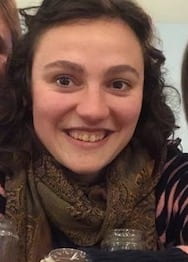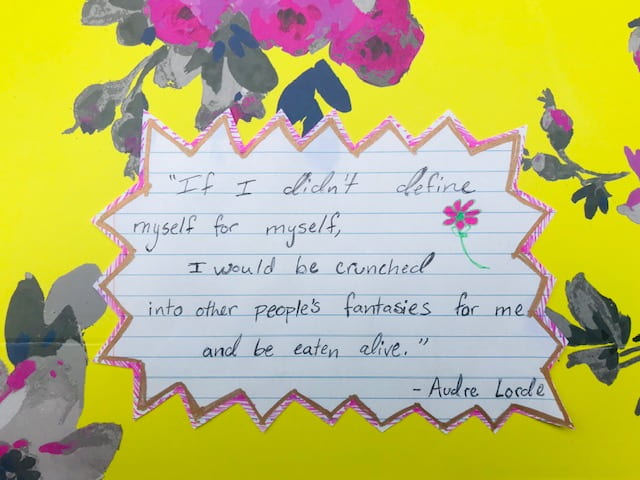We are very pleased to announce the 2020 recipients of the Vivien Hartog Graduate Student Teaching Award: Annu Daftuar, Val Moyer, and Melis Umut.
Congratulations to Annu, Val, and Melis!



First, we want to tell you a bit about this award and Vivien Hartog. Then, the advisors of the three graduate students will present this year’s winners.
This award is named in honor of Vivien Hartog, a Women’s, Gender, and Sexuality Studies graduate certificate student who died before she could complete her Ph.D. in Sociology. It goes to the graduate student instructor we think most exemplifies Vivien’s lifelong commitments to activism, teaching, and learning. Here’s a description of Vivien written by her family that captures something of the kind of person we are honoring with this award:
“In Vivien Hartog’s 55 years, she went through more identities than most could imagine. An incomplete list would include: rebellious daughter; actress in training; young mother, wife (3 times); scientologist; scourge of scientology; business woman; domestic help in a hotel; undergraduate; radical feminist and lesbian; graduate student in sociology and women’s studies. At every point she both threw herself into her new identity and at the same time, remained herself. And one way that she always remained herself was in her commitment to social justice and to human rights. She remade herself regularly, but she always understood her remaking as struggles on a larger stage. Particularly in her last decade, she saw her life through the lens of an international women’s movement.”
Professor Nancy Hiemstra on Annu Daftuar:
I am thrilled to present the Vivien Hartog Graduate Student Teaching Award to Annu Daftuar, who truly exemplifies Vivien Hartog’s lifelong commitments to social justice, activism, teaching, and learning.
Since beginning her doctoral studies in the Department of Women’s, Gender, and Sexuality Studies in 2016, Annu has excelled at teaching a range of courses, first as a Teaching Assistant and now as a solo instructor. As a woman of color originally from the Global South, she serves as an inspiring role model and mentor to all of her students. She consistently designs and teaches her courses with great care and thought, endeavoring to create a feminist classroom space, and aiming to make students’ learning experience different, accessible, and transformative. In addition to introductory courses, Annu has drawn on her own expertise and interests to provide outstanding learning experiences for her students. For example, in “The Global Politics of Reproduction,” Annu built on her dissertation research on the transnational surrogacy industry in India. Looking through student evaluation comments for this class, I was impressed by the rave reviews, including this one: “This has been one of my favorite courses at Stony Brook…Annu is such a badass professor and it was an honor to be her student.”
Now it is my pleasure to present the honor of this award to Annu. Congratulations!
Professor Lisa Diedrich on Val Moyer:
I am delighted to tell you about Valerie Moyer, one of the winners of the 2020 Vivien Hartog Graduate Student Teaching Award. Like Vivien Hartog, Val’s research, teaching, and on- and off-campus activism start from a commitment to social justice and inclusion.
Val’s dissertation, “Muscularity, Hormones, and Other ‘Threats’ to Women’s Sports,” is timely and important. Using track and field as a case study, she investigates the question: What is a “woman athlete”? She discusses the many processes of becoming a woman athlete, in terms of building physical capacity at the micro-level of muscles and molecules through training and fitness, as well as at the macro-level through social and political advocacy and activism to challenge assumptions about femininity and to open up opportunities for women and girls to participate and compete in sports across the world. Her work shows a generalized anxiety about the possibility of “unfair advantage” that circulates around women athletes. This anxiety also operates across multiple scales—at the level of individual bodies, between bodies in competition, and between nations in international sporting organizations and competitions. In “Threatening the Gender Hierarchy in Women’s Sport,” a blog post for Nursing Clio, Val discusses recent requirements that Caster Semenya suppress her testosterone levels in order to allow her to continue to run competitively, and she argues that these are part of a longer history of experiments in sex testing in sports that have sought to exclude some women, especially black and brown women, from competing. She points out the important historical fact “that women with higher testosterone have been a part of women’s sports all along.”
Val has excelled at Stony Brook not only academically but also as a teacher and departmental and campus leader. She has received stellar reviews as a teaching assistant and instructor for a variety of classes, including Histories of Feminism, Intermediate Writing, and Unfair Advantage: The Politics of Track and Field. To use a sports metaphor (!), Val is a consummate team player. In her second year in the program, Val was chosen by her fellow graduate students to be the graduate representative in the department. By all accounts, she was a great success in this position, garnering the admiration of graduate students and faculty alike. She also served as one of the organizers of the WGSS graduate student conference “Spaces of Dissent” and as the department mobilizer for the Graduate Student Employee Union at a time when the GSEU has actively campaigned to eliminate graduate student fees. This work continues.
Congratulations, Val!
Professor Victoria Hesford on Melis Umut:
It gives me great pleasure to present the Vivien Hartog Outstanding Graduate Instructor Award to Melis Umut! Like Vivien Hartog, in whose memory this award is named, Melis has an adventurous spirit. She has travelled far—from Istanbul, Turkey, to Hungary, the UK, and the US—all in pursuit of her education in feminist media and film studies. Melis’s travels have also taken her across disciplinary borders—she has pursued graduate degrees in visual culture, cultural studies, and gender studies, and she has read widely in feminist film and media studies, psychoanalysis, disability studies, and porn studies. Melis is a true intellectual, someone who is excited by ideas and eager to learn. While working on her dissertation, “Erotic Visuality and Popular Culture in a Conservative Society: 1970s Turkish Erotic Melodramas and the Muslim Sexual Imagination,” Melis continued to sit in on graduate seminars (including most recently, Patricia Clough’s seminar on “The Political Unconscious” at NYU), and attend public lectures and talks. Before the lockdown put an end to travel and conferences, Melis was writing a paper, based on a dissertation chapter, for SCMS—the Society for Cinema and Media Studies—the premier conference in her field. Melis loves living in New York because of the cultural and intellectual experiences it offers—it is a city that appeals to her sense of adventure.
Melis’ wide-ranging intellectual curiosity also informs her teaching. She has taught classes at the introductory level for Women’s, Gender, and Sexuality Studies, as well as topics classes in film and on transnational and non-normative sexualities. For her class on non-normative sexualities, Melis introduced students to intersectional analyses of sexuality and disability as well as performance art and sex work. It is through this kind of formal and conceptual experimentation that Melis presents her students with new ways to think about sex, visual culture, and gender. And I know from my observations of her teaching, that Melis loves to challenge her students by showing them difficult or provocative performance and visual art. Melis encourages her students to see things differently by introducing them to a way of looking not determined by the commodified forms of visual culture we are immersed in in our daily lives. In this sense, Melis is a classroom activist in the best tradition of Women’s, Gender, and Sexuality Studies.
Congratulations Melis!
















